Preview & Predictions for the 2016 Chess Olympiad

In a couple of days, the 42nd Chess Olympiad will be assembling in Baku, Azerbaijan which sits off the Caspian Sea. Attendees will have an idyllic view of the famous seafront as they represent the flags of 176 countries. There are few sporting events like the Chess Olympiad… perhaps it is unique in its scope and diversity. There are few events where you have so many nations and so many different skill levels competing. The fact that you have professional chess players mixing with the general populace makes it quite appealing. In fact, professional players extol the opportunity to be close with their fans as it becomes more of a chess festival.
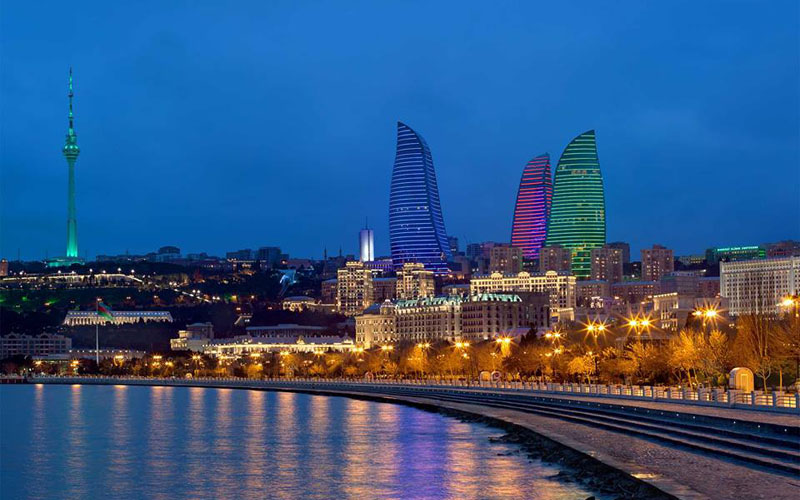
The skyline of Baku, Azerbaijan
There have been a few reports released by the organizers and by all accounts, it has the makings of being a top flight event. However, there will be a number of notable absentees. Peter Doggers penned preview at chess.com titled “Who Is (and Who Isn’t) Playing The Olympiad?” While teams like Russia, the U.S., China and host Azerbaijan are fully-loaded, three-time Olympic champion Armenia will not be in attendance due to the political tensions between the countries. There had been negotiations to provide security needed, but apparently the Armenian players felt that they would not be able to perform under those conditions. According to the chess.com article, GM Smbat Lputian stated,
Not as the Vice President as the Chess Federation but as a chess player I understand the decision of our chess players as taking part in this kind of important tournament they have to possess inner and external peace in order to show their best results. It’s a pity that according to chess players given the current situation Armenian-Azerbaijani relationship the latter is not possible.
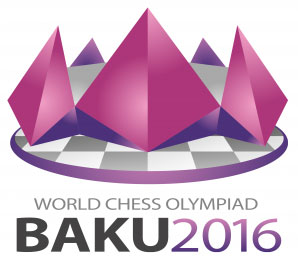
Armenian players competed in World Cup tournament last year in Baku, but there is no report on their experience. Be that as it may, a powerful force missing at the Olympiad means that a number of other federations will have a shot. Teams like Cuba and Poland will become instant contenders and India looks to repeat last year’s success. Azerbaijan will have the addition of Arkadij Naiditsch, the host country will fill the strength gap of Vugar Gashimov, but of course the fallen Azeri’s loss was a blow to the teams camaraderie. The country will field three teams with Azeri 2 poised to attack strong teams in order to help Azeri 1… as in a cycling competition. Perhaps they have ambitions of their own!
Looking at the landscape of the Olympiad, many top players will not be present, but before we list them, it is important to note that both Magnus Carlsen and Sergey Karjakin will be playing for Norway and Russia respectively. Here are the list of active heavyweights who will not be traveling with their national teams (both open and women’s).
Vassily Ivanchuk (Ukraine)
Peter Leko (Hungary)
Boris Gelfand (Israel)
Emil Sutovsky (Israel)
Etienne Bacrot (France)
Krishnan Sasikiran (India)
Julio Granda-Zuniga (Peru)
Ivan Cheparinov (Bulgaria)
Kiril Georgiev (Bulgaria)
Alexander Delchev (Bulgaria)
Humpy Koneru (India)
Tatev Abrahamyan (USA)
Without these top players (especially in the case of Bulgaria), the teams will certainly have an uphill battle, but young players will be looking to capitalize off of the opportunity. Also in the Internet age, we will see how much the gap has closed. First-round upsets are looming throughout the playing hall as we routinely see players from developing federations taking scalps. Asian countries continue to make strides and bagged the gold and bronze in Tromso. Such success will be difficult to repeat. Here are the top 20 teams and their top player (by rating).
September 1st-14th, 2016 (Baku, Azerbaijan)            |
|||||
|---|---|---|---|---|---|
|
#
|
Federation
|
Flag
|
Team ELO
|
Top Player
|
Rating
|
| 1 | Russia |
   |
2760 | GM Vladimir Kramnik | 2808 |
| 2 | USA |
   |
2740 | GM Fabiano Caruana | 2807 |
| 3 | China |
   |
2735 | GM Wang Yue | 2737 |
| 4 | Azerbaijan |
  |
2705 | GM Shakhriyar Mamedyarov | 2764 |
| 5 | Ukraine |
      |
2688 | GM Pavel Eljanov | 2737 |
| 6 | France |
  |
2678 | GM Maxime Vachier-Lagrave | 2819 |
| 7 | Poland |
   |
2677 | GM Radoslaw Wojtaszek | 2733 |
| 8 | England |
  |
2672 | GM Michael Adams | 2727 |
| 9 | Hungary |
   |
2656 | GM Richard Rapport | 2752 |
| 10 | Netherlands |
  |
2654 | GM Anish Giri | 2769 |
| 11 | India |
   |
2651 | GM Pentala Harikrishna | 2752 |
| 12 | Germany |
   |
2644 | GM Georg Meier | 2657 |
| 13 | Spain |
  |
2628 | GM Francisco Vallejo Pons | 2713 |
| 14 | Cuba |
  |
2622 | GM Leinier Dominguez Perez | 2720 |
| 15 | Israel |
  |
2622 | GM Maxim Rodshtein | 2698 |
| 16 | Croatia |
  |
2619 | GM Ivan Saric | 2667 |
| 17 | Norway |
  |
2613 | GM Magnus Carlsen | 2857 |
| 18 | Czech Republic |
  |
2604 | GM David Navara | 2742 |
| 19 | Belarus |
  |
2602 | GM Sergei Zhigalko | 2656 |
| 20 | Turkey |
  |
2599 | GM Dragan Solak | 2633 |
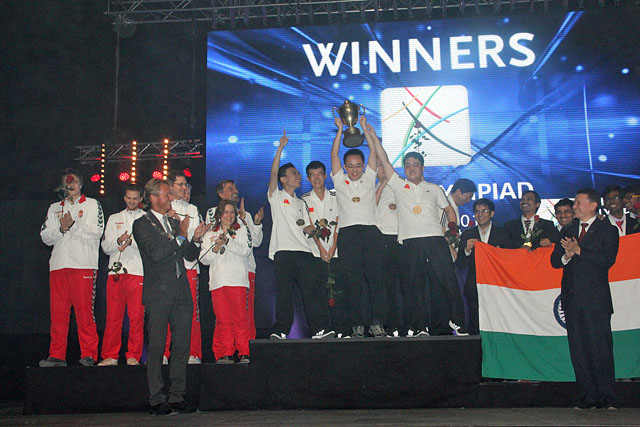

China’s Ni Hua hoists the cup at the 2014 Olympiad in Tromso, Norway.
Photo by Daaim Shabazz.
            |
|---|
It’s been a long time since the USA has won an Olympiad tournament and even longer since they were the odds-on favorite. With bronze medals in 2006 and 2008, the Americans looks to get the gold medal with with the most powerful team in the country’s history. With the “Murderer’s Row” of Fabiano Caruana (2807), Hikaru Nakamura (2791) and Wesley So (2771), anything less than a medal would be considered a disappointment.
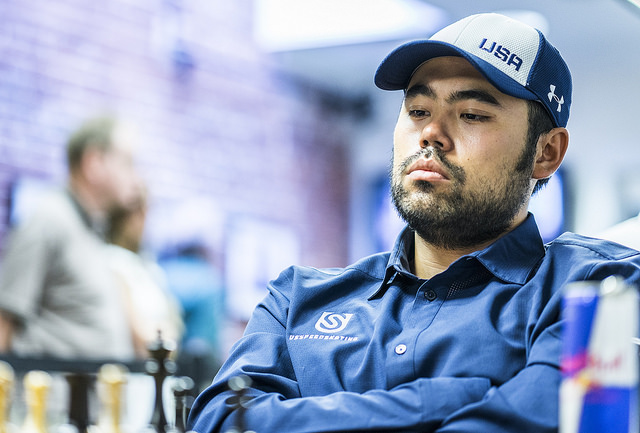

In their version of “Murderer’s Row,” Hikaru Nakamura could score big.
Photo by Lennart Ootes.
With So coming off of a strong performance in the Sinquefield, the team seems to be top heavy. However, they have the talented Ray Robson and Samuel Shankland who won a gold medal in Tromso with a sparkling 9/10. The key here will be whether the disparate parts fit together in this young team. Figuring out what to do with the top three boards is a luxury no team can boast… not even Russia.
             |
|---|
The defending Olympiad champions have been riding high since their emotional, tear-soaked celebration. It was the culmination and perhaps a relief of all the frustrations from the past. Ni Hua lead the team with solid result avenging his disastrous loss to cost China the gold medal in the 2005 World Team Championship. He retired from the national team with a clear conscience.
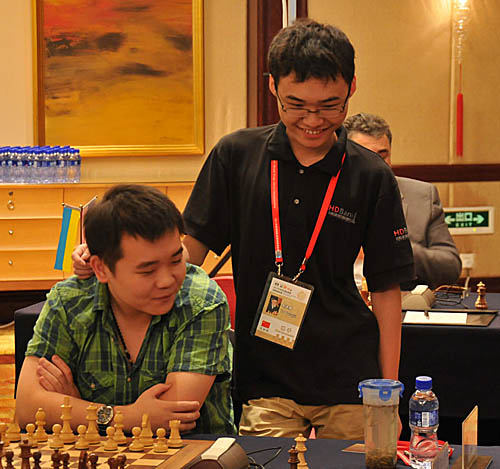

Yu Yangyi being and Li Chao share a light moment at 2011 World Team Championships. Cameraderie is one of the recipes of traditional success for China. Many of these players evolved as school kids together. Photo by Wang Liang, https://sports.sina.com.cn/chess/.
The good part is the Chinese team is young with Ding Liren and Yu Yangyi dominating lower board. Ding had 7.5/10 and Yu scored 9.5/11 carrying the team to gold. This team will feature Li Chao, who like Wang Hao, missed Tromso. How is it that you can leave three 2700s at home and still win? With the rise of Wei Yi and the rock-solid pedigree of Wang Yue on board one, China is in a good position to medal once again.
                |
|---|
Eltaj Safarli was glad to boast to me about Azerbaijan beating the US while we stood in the airport line. Shakhriyar Mamedyarov’s win in the last round helped prevent the Americans from the medal stand. The result did not win the bronze for the Azeris, but allowed India to sneak in after the overachievers beat Germany and crushed a beleaguered Uzbekistan. Ironically, Germany’s Arkadij Naiditsch changed federations and will play his first Olympiad the Azerbaijan. Thus, the host country is the beneficiary of migratory talent.
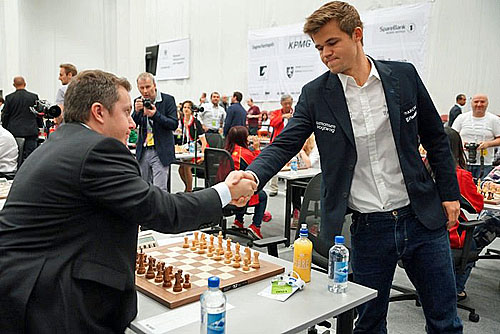

Arkadij Naiditsch before beating Magnus Carlsen
2014 Chess Olympiad, Tromso, Norway
Photo Paul Truong.
The buzz in the chess world was that the Latvian-born Naiditsch was approached by Azeri officials and he switched into a better situation. The reason that Azerbaijan will be in the medal hunt is obvious. They are seeded 4th, they have Shakh and Radja (Teimour Radjabov), they have home court advantage which includes immense support of the country. The chemistry is also incredible and has resulted in two European Team Championships. With the addition of Naiditsch (as a reserve!), the team will be in medal contention.
                  |
|---|
Vladmir Kramnik has been battling health problems lately and withdrew from the Sinquefield Cup as a result. Having “Big Vlad” is extremely important as he provides veteran leadership and steadiness at the top. However, Russia has not won the tournament since Bled, Slovenia in 2002 when Garry Kasparov was still running the tables. The Russian team has lacked chemistry and they have tried many different lineups, never finding the formula for gold. Despite their lofty rating, they will have to overcome this issue and Andrei Filatov is tasked with this job.
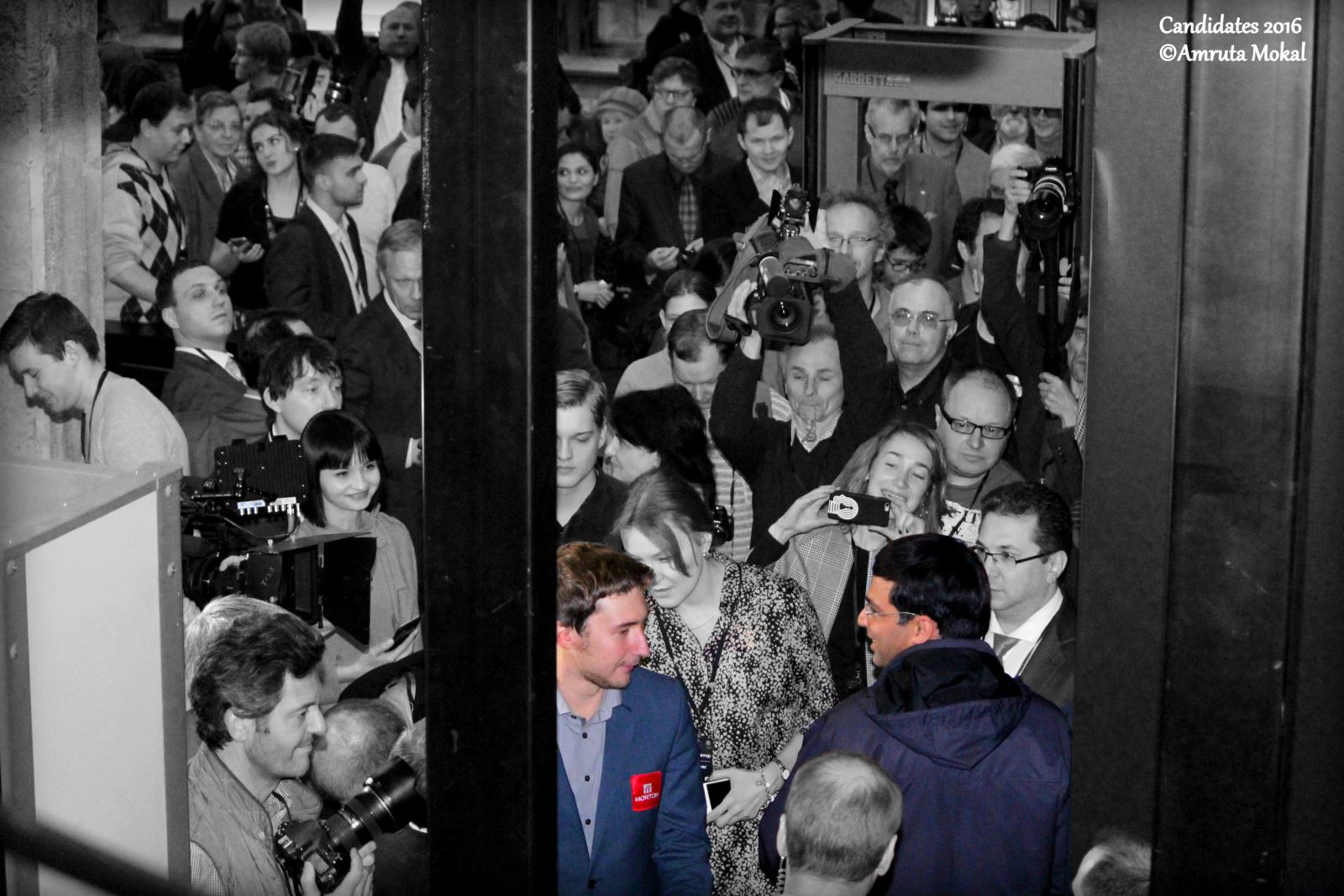

In Anish Giri’s book on candidates to dethrone Carlsen, ten players were featured. Sergey Karjakin was not one of them. Will this outing be an important confidence builder going into the match in November, or confidence breaker? Photo by Amrita Mokal.
Sergey Karjakin had medal outstanding performances with the Ukraine and scored 7/10 for Russia in Tromso. Will he be thinking about withholding preparation while Magnus Carlsen hides some of his (playing weaker teams)? Who will step up for Russia? Evgeny Tomashevsky hopes to bring his World Cup performance with him to Baku. If the lower boards don’t score, Russia may be off the medal stand.
        |
|---|
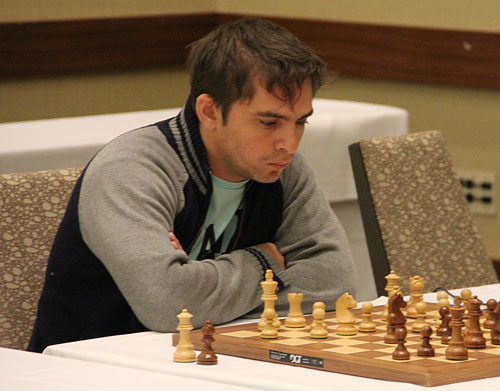

GM Lazaro Bruzon was in fine form in Tromso.
Photo by Daaim Shabazz.
A surprise pick for the top five, but this team has been itching to break through. The team that brought us Jose Raul Capablanca is ranked 14th, but has the same five core of players. Perhaps this group may not have quite enough to take a medal, but if Lazaro Bruzon gets 8/11 as he did in Tromso, the team may improve on their 7th place. Beating India, Israel and England was a feat, but the team will rely on the stability of Isan Suarez Ortiz. Ortiz won a silver medal on board 4 in Tromso. One x-factor is the chemistry. These players have been seen traveling the world representing the Cuban flag with great passion and valor. In a time where emerging nations are beginning to flex muscles, Cuba’s time to medal may be now.
In the women’s field, the usual suspects are at full strength with three-time defending champion Russia leading the way with top-seed China on their heels and both the Ukraine and Georgia fielding strong teams. GM Humpy Koneru of India is not suiting up this year so it paves the way for one of the many talented juniors. Play in the women’s sector has stagnated a bit as China is the only team over 2500 and only four are over 2400. This issue may be taken up by the FIDE Women’s Commission on Chess as there has been problems in the championship cycle as well. In fact. Hou Yifan has already given hints that she will abandon the cycle if not reformed. Nevertheless, the games will be hotly-contested as the field will try to break the Russian streak.
September 1st-14th, 2016 (Baku, Azerbaijan)                  |
|||||
|---|---|---|---|---|---|
|
#
|
Federation
|
Flag
|
Team ELO
|
Top Player
|
Rating
|
| 1 | China |
   |
2528 | GM Hou Yifan | 2658 |
| 2 | Russia |
   |
2493 | GM Alexandra Kosteniuk | 2538 |
| 3 | Ukraine |
      |
2485 | GM Anna Muzychuk | 2544 |
| 4 | Georgia |
  |
2474 | GM Nana Dzagnidze | 2529 |
| 5 | India |
   |
2410 | GM Dronavali Harika | 2542 |
| 6 | USA |
   |
2376 | GM Irina Krush | 2444 |
| 7 | Hungary |
   |
2374 | GM Hoang Thanh Trang | 2467 |
| 8 | Germany |
   |
2371 | IM Elisabeth Paehtz | 2476 |
| 9 | Poland |
   |
2360 | GM Monika Socko | 2454 |
| 10 | Bulgaria |
  |
2346 | GM Antoaneta Stefanova | 2515 |
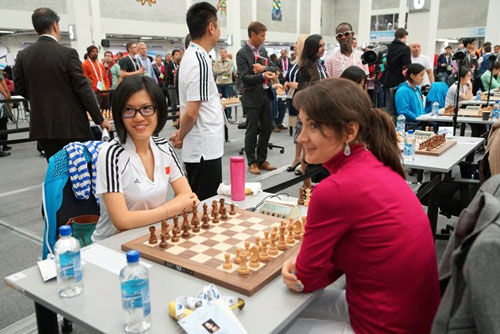

Kateryna Lagno defeated Hou Yifan
in a key game in 2014 China-Russia match!
Photo Paul Truong.
             |
|---|
China has been dominant in the women’s circuit for nearly two decades. They have scored twelve Olympiad medals in the last thirteen tournaments (four gold, four silver, four bronze). However, the last three Olympiad have been won by Russia. The disappointment of the Chinese has been apparent at the closing ceremonies, but perhaps they will be more focused. For a country with four women’s world champions and talented juniors emerging, the country is not satisfied with the past laurels. Nothing short of gold will be sought for. Hou will be at the helm and she has a strong supporting cast.
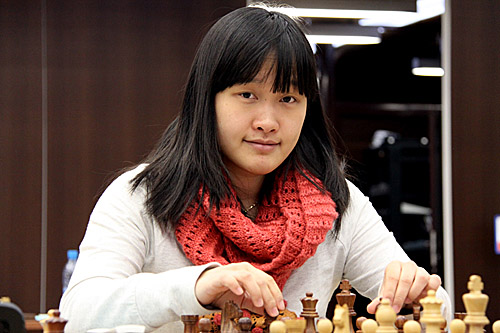
Will Zhao Xue get one of her Fischer-like scores?
Zhao Xue is now 31 year old. It seems like only a few years ago that she was rolling up prodigious scores as a teenager (11/12, 2002 Bled Olympiad; 10/12, 2004 Calvia Olympiad; 10/13, 2006 Turin Olympiad). Her results are still strong, but consistency is not always there. Ju Wenjun has taken up the role of executioner scoring 8/11 in Tromso. As a team, Chinese lost only to Russia (3-1), but is fielding the same exact team with the idea of keeping stability. This may be the last Olympiad before the country of 1.4 billion unleashes a wave of young talent.
              |
|---|
This team is still solid and even better chemistry with the wunderkind Aleksandra Goryachkina having come up through the national ranks. Kateryna Lahno won a medal, but the Ukrainian transfer is not in the team in Baku. Yet they have a credible chance to defend their crown. In Tromso, Valentina Guinina scored a prodigious 8/10 to take the gold medal on board two. Alexandra Kosteniuk is back on board one after a gold medal performance of 7.5/9 on board three. Both Natalia Pogonina and Girya Olga were on the gold-medal team in Tromso and are both seasoned veterans.
.jpg)
“Threepeat” for the Russian women in Tromso, Norway!
Photo by Daaim Shabazz.
One to keep an eye on is the 17-year old Goryachkina. She is a heavily-decorated as the World Under-10 Girls Champion in 2008, the European Under-12 Girls Champion in 2010, and both the European and World U14 Girls Champion in 2011 (scoring 9/9 in the latter). In the last four years, she has continued her dominance winning both the European and World U18 Girls Championships in 2012 and winning World Junior Girls Championship in 2013 and 2014. She helped Russia win silver last year at the World Team Championship in Reykjavik and also bagged a silver medal on board three. Last August she won the Russian Women’s Superfinal becoming the youngest national champion since Kosteniuk.
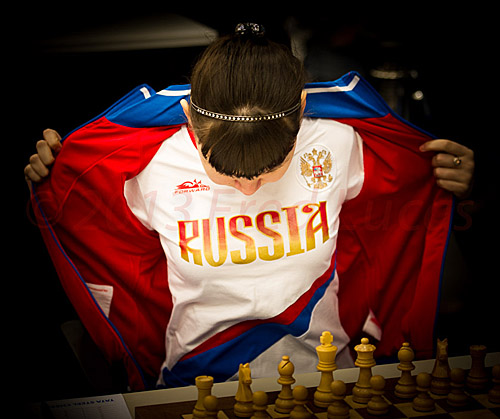

The future of Russian women’s chess, Alexandra Goryachkina.
Photo by Fred Lucas.
                  |
|---|
With two former women’s world champions (Anna Ushenina and Mariya Muzychuk) and one player having been over 2600 (Anna Muzychuk), the Ukraine hopes to bring the gold back to the Ukraine. With political tensions in the troubled nation, two defections (Sergey Karjakin and Kateryna Lahno) and Vassily Ivanchuk nixing the games for draughts tournament, it would be a sweet victory. In the past 20 years, only five teams have won a medal of any color: China (9), Russia (9), Georgia (5), Ukraine (4) and Poland (1).
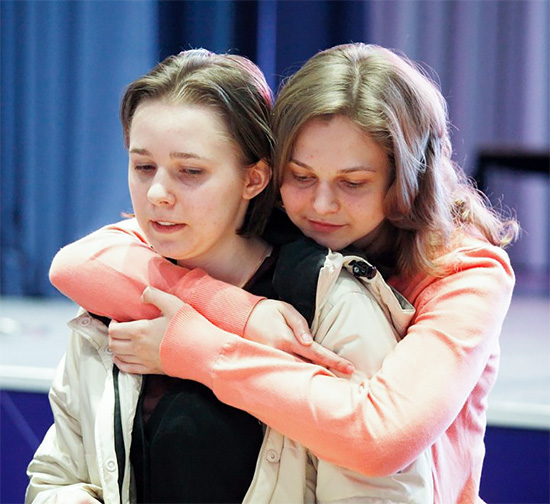

Mariya Muzychuk and sister Anna Muzychuk. The strongest pair of sisters since the retirement of the Nadezhda Kosintseva and Tatiana Kosintseva of Russia.
The Ukraine won the title in 2006 and silver in 2008 before the inclusion of the Muzychuk sisters. Anna was recruited, sponsored by and played for Slovenia for ten years while Mariya was making a move up the ranks. Natalia Zhukova and Anna Gaponenko are wily veterans having represented the Ukraine in several Olympiad tournaments.
            |
|---|
The 2018 Chess Olympiad will be hosted in Tblisi, Georgia, a country with a strong chess tradition. In fact, it is the women who carry most of the trophy hardware. Bolstered by the world champion tradition of Nona Gaprindashvili (1962-1978) and her protege Maia Chiburdanidze (1978-1991), both have left the tradition in capable hands. Nana Dzagnidze has been the top player for years and was a member of the Georgian team that won the gold medal in 2008. Ironically, she was not a member of the team that won the Women’s world team last year.
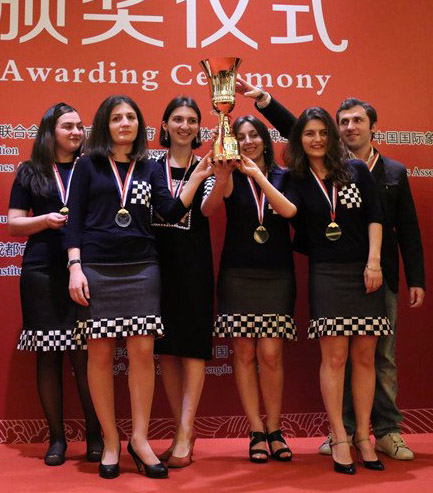

Georgian winning the World Team last year in Chegdu, China.
Photo by Liu Yupeng.
Four members of the current Olympiad team were on that winning team. Bela Khotenashvili scored 7.5/9 points led the team with a 2699-elo performance and board medal while Lela Javakhishvili, Meri Arabidze, Nino Batsiashvili and Salome Melia were also . Arabidze is not in the team despite being a star performer at World Team.
            |
|---|
Without Koneru Humpy on board one, it is hard to see India compete for a medal, but the Indian men showed how to beat the odds by winning bronze without Viswanathan Anand. India is blessed with a wave of young talent but will be led by Dronavali Harika and rising star Padmini Rout. Rout won a gold medal on the reserve board in Tromso, but has vaulted up to board two. Her improvement has been rapid and she has played internationally in the USA and Europe.
.jpg)
WGM Padmini Rout, the Indian star with her trademark wealth of hair,
had a wonderful performance with 7.5/8.
Photo by Daaim Shabazz.
The youngest member of the team is Pratyusha Bodda a past under-17 champion. Now 18, she has won in practically every national age group and is from the same region as Koneru and Harika. Here she is being interviewed prior to her press conference announcing her WIM title.
The Indian team has a nice mixture of veteran leadership in Harika, the youth of Rout and Bodda and the fighting spirit of Tania Sachdev and Soumya Swaminathan.
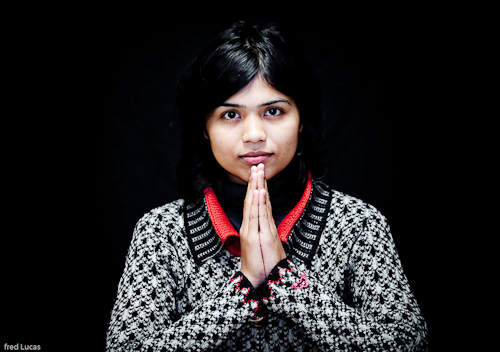

Soumya Swaminathan
Photo by Fred Lucas.
* * *
Drum Coverage: https://www1.bakuchessolympiad.com/https://www.thechessdrum.net/

2 Comments